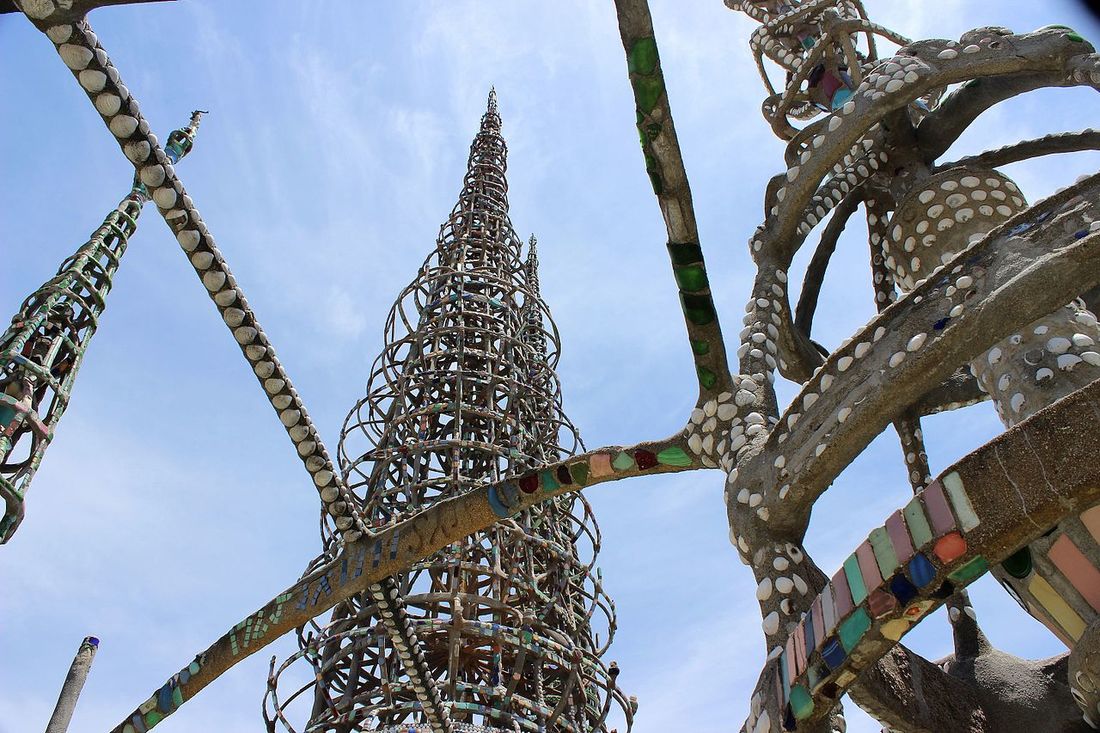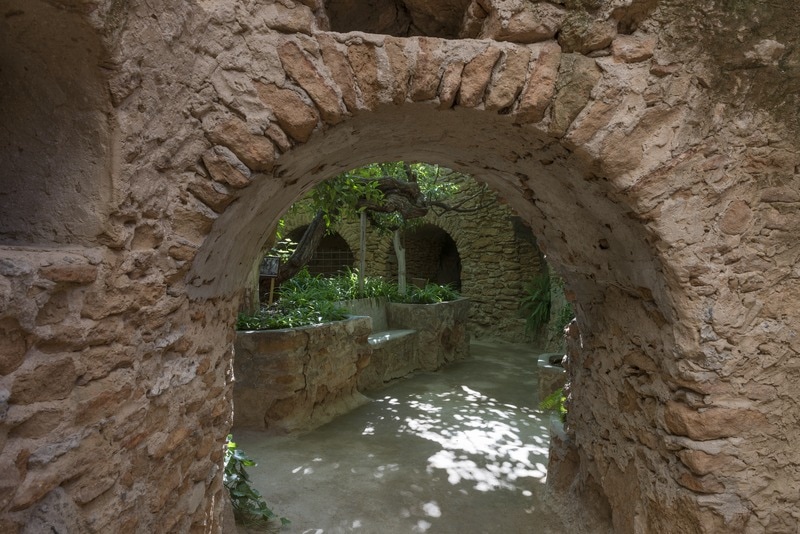|
Art Brut I. Baldassare Forestiere tunneled under to sculpt the earth into subterranean baths, gardens and grottos— one hundred chambers excavated with hand tools, picks, a shovel and sometimes a mule to move bigger rocks. Thrown out of olive groves by his father, he traveled with the idea of growing citrus. A new arrival, he bought hardpan, rocky land that could never prosper in a valley perennially burned by summer sun, soil-cracked by drought, fog-swamped in winter. He survived by levelling other farmers’ tracts and grafting fruit trees. To escape the heat, he went underground, one scoop of dirt at a time, dreaming of catacomb passages, a cool alcove, a snug bedroom, a garden view lit with skylights. In a cavern, eight—twelve—metres below, he would grow wonder trees, one citrus bearing eight kinds of fruit. He would treat some woman, wife, to cedrons, navel oranges, Valencias, tangerines, grapefruits, and sweet lemons, while she bathed in his hand-carved tub. In brick planters, pear trees would thrive, pomegranates, almonds, mulberries, palm dates, persimmons, and strawberries, red grapes and green, rosemary, myrtle-- his fish pond stocked with fish caught in the San Joaquin River, his own brand of wine hand-pressed, Sangre di Christo-- All of this did come to pass, his villa, after forty years of burrowing, but the woman did not want to play Persephone; she would only have him above ground. She could not see the charm of his spliced trees, the sweet globes of fruit glowing in sun shafts of his cavernous honeycomb. He hand-scraped dirt, dredged scrabble, strained his back with wheelbarrow loads to remake the lower world into his own image. He stayed alone. Ten acres of an ant colony, piazzas in deep vaults, meetings halls, a space for a restaurant and dancing-- he imagined a peopled resort, where others could see in the braced ceilings and clay-tiled patios who Baldassare Forestiere was, a man with little money, who sculpted himself and propagated a wonder tree still growing a bounty seventy years after his death. I have walked down into the earth, descended into Forestiere’s gardens, imagining his evenings, reading, in his small bedroom, alone and buried (for he did like to read), sitting next to the starlit skylight to tune the radio, lifting a tired arm to put a strawberry in his mouth. II. Maybe I’ll go to the sky, Sabato said after his wife left and he tired of swimming in wine bottles. He walked the railway lines to gather cast-off rebar, rods he webbed into steel latticework of spindles and steeples, scalloped cones, and ribbed tetrahedrons. He climbed higher daily, yearly. Like a boy pulling himself up, level after level of a rocketship jungle-gym in an abandoned park, he climbed inside his airy cages. He knitted gridiron, wrapping spines in wire mesh, troweling on cement, embellishing with shells, florid china teacups, blue willow plates, toy cars, mirrors, cobalt shards of Milk of Magnesia, 7-Up bottles and porcelain figures. After three decades, his funky lace towers did reach clouds. Thirty meters up, he intertwined needletops with arched bridges, more narrow than the width of his foot. He traversed his scaffold without hand rails, grown used to misted views of Watts. He invited all to visit Nuestro Pueblo, and neighbours came to trace pottery chunks in the walls and roofless doorways, to look up, to feel it all with their hands. Sabato Rodia embedded himself into all crevices of his lifework. Earthquakes and riots could not pull it down. I have put my hand on his walls, seen the patchwork curios. What if I used my one life to construct these stony geometries with only hands and thrown-out scraps? Keep faith, Sabato, despite the neighbourhood gawking and talking, in the beauty of delightful dream spires. III. Reinaldo Rios’ OVNI scouts film shaky, homemade movies, tracking aliens through a snarl of vines and plantains in night yards of Lajas, where a woman believes she was abducted into the surgical room of a spaceship, returning to Earth with scrambled intestines. The rainforests of El Yunque hide secret labs where the U.S. military examines extraterrestrials and creates genetic mutants that sometimes escape. In an island of alien invasions, Roberto’s vision began with ink doodles on lunchtime napkins, sent as love missives to his novia de escuela superior. He wrote his contract to her on tissue wisps ink-carved with flying saucer designs of the home he would one day put her in; she crumpled his banners of love and ran, as women do, when placed upon an altar that portends a man’s nebulous inner journey. He studied industrial arts and fine arts—tending his love wound-- taught, saved, borrowed, retired, still intent on crafting his napkin blueprints into a hillside glory where he could sit, gazing down into traffic-- the centre of his own universe. My headlights just two more dots in the light stream wending homeward, by Juana Díaz, along the south coast, where near the sea, the highway cuts through Peñoncillo, I see the flying saucer, touched down on a green hill. In cosmic dusk, seen in satellite shots, the Caribbean archipelago is a lit constellation, with Puerto Rico so electrified that the island is perfectly outlined, glistening in space. One blue star in its cluster is Roberto’s three-tier saucer, constructed of panels of shining blue float glass, coloured landing lights around the base, flashing silver domes. That Blue Nun blue of Marc Chagall’s stained glass, lighting up the hill, dazzling the sea behind it— slowing the tired motorists. For forty years he planned and built for seven, raiding the auto-junkers and dollar stores, crafting each element of the exterior and interior-- hundreds of cheap silver ashtrays welded on the top tower; blue, red, yellow plastic salad bowls capping the bright running lights. Inside, floating furniture is fastened to walls, a table built from a chromed exhaust manifold and auto glass. His paintings of planets and one weeping rose. Roberto Sánchez Rivera sits outside on the cool upper deck of his saucer. He has placed a plaster alien there that raises a hand to point at the horizon, like our Ponce de Leon statues in pueblo plazas. I see Roberto in his boxer shorts with a bucket of iced medallas. He’s not moping over Stella, that high school beauty, or staring forlornly out at some far exoplanet revolving around a stellar corpse. He is in the moon glow of tonight’s dance, where he met someone and handed her a napkin twirled into a rose. He thinks of adding more woomp to his saucer, maybe a gyromotor, a liquid hydrogen something, a magneto plasmico engine, a clutch. He’ll scoop one fist of earth, bend one rod of rebar at a time, grab one handful of stars; he will add order to chaos and funnel himself into his creation. He amazes us with his vessel, zooming to celestial lift-off, before some other cabrones colonize space. Loretta Collins Klobah Loretta Collins Klobah is a professor of Caribbean Literature and creative writing at the University of Puerto Rico. Her poetry collection The Twelve-Foot Neon Woman (Leeds: Peepal Tree Press, 2011) received the 2012 OCM Bocas Prize in Caribbean Literature in the category of poetry and was short listed for the 2012 Felix Dennis Prize for Best First Collection in the Forward poetry prize series. Her poems have appeared in The New Yorker, Best American Poetry 2016, BIM, Caribbean Beat Magazine, The Caribbean Writer, The Caribbean Review of Books, Poui: The Cave Hill Literary Annual, Susumba’s Book Bag, Moko: Caribbean Arts and Letters, WomanSpeak, TriQuarterly Review, Quarterly West, Black Warrior Review, The Missouri Review, The Antioch Review, Cimarron Review and Poet Lore.
0 Comments
Your comment will be posted after it is approved.
Leave a Reply. |
The Ekphrastic Review
COOKIES/PRIVACY
This site uses cookies to deliver your best navigation experience this time and next. Continuing here means you consent to cookies. Thank you. Join us on Facebook:
July 2024
|





